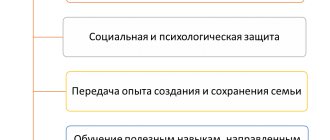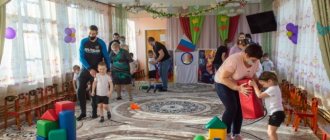Types of joint activities between children and parents
Types of joint activities of children with parents.
Organization of holidays:
children's birthday, Christmas holidays, Children's Day, Holiday of knowledge.
The holiday atmosphere will definitely bring adults and children closer together in preparing the environment, writing a script, creating a menu, and making prizes. It is better if each family member independently prepares competitions, costumes, games, surprises, and takes an active part.
Creativity
The child himself must become the initiator of such activities. The parent joins in the creative work offered by the child. At the same time, an adult can offer his own projects: making a collage from natural materials, publishing a family wall newspaper, making greeting cards. This promotes the development of children's imagination, independence and self-expression.
Reading books
There is a “Reading Hour” of books of the child’s choice or a special ritual before bedtime. At such moments, along with the development of the cognitive sphere, the child develops moral and personal qualities without direct moral teaching. And most importantly, at such moments the child has a desire to talk about his secrets and problems.
Cooperative games
Board games such as: lotto, dominoes; printed board games; verbal-logical, etc. enhance close interaction between children and parents. Play is a very pleasant activity for a child, within which he develops and at the same time is educated. During play with a child, an adult finds himself in a situation “on equal terms.” And when the child explains the course and rules of the game, the adult falls into the role of “learner.” In joint play activities, the formation of moral and volitional qualities of the child’s personality occurs.
Theatricalization
Children are fans of dressing up and transforming using the wardrobe of adults. Of course, at such moments the child needs spectators, who become parents. In such activities, children realize themselves and become liberated, practicing and acquiring new forms of communication.
Family excursions and trips
Such trips can be organized to a park, a forest, or a museum. The parent acts as the leader, and the child is involved in planning the route: where they will go, what to take from food, toys. During the excursion, the adult encourages the child to be active in learning about the environment.
Visiting theaters and cinemas
At the initial stage, the initiator of such visits is the parents, introducing the child to the world of beauty. Then the children themselves choose the place and topics of viewing.
Maintaining family albums, filling out the “Album of Discoveries”
This is an interesting, exciting activity between parents and a child, through which adults become clearer and closer to their children, and children become closer to adults, which helps strengthen family relationships. By getting to know himself, the world around him, and other people, a child can at any moment receive understanding and support from a loved one.
Interaction between children and parents in a festive space
Bibliographic description:
Grishina, I.V. Interaction of children and parents in the festive space / I.V. Grishina. — Text: immediate // Education: past, present and future: materials of the VI International. scientific conf. (Krasnodar, May 2021). — Krasnodar: Novation, 2019. — pp. 9-11. — URL: https://moluch.ru/conf/ped/archive/330/15049/ (access date: 12/19/2021).
Family and preschool institutions are two important institutions for the socialization of children. Their educational functions are different, but their interaction is necessary for the comprehensive development of the child. Involving the family in the life of the kindergarten is one of the main components of the work of our preschool institution. Who are they, the parents of our students? These are people very different in education, well-being, views on the development of society, but united by one common interest - they want their child in kindergarten to feel confident and comfortable, to be happy and to develop successfully. Therefore, our task is to create opportunities for success for every child every day.
I would like to touch on one aspect of cooperation with parents, namely, their participation in the preparation and organization of children's parties.
I start communicating with parents by conveying to them a positive image of the child, which is the basis of a trusting and business contact with them, in which I emphasize the positive personality traits of the child, his successes in musical activity, which manifested themselves during classes. Usually, based on the achieved trust, parents have a need to share information about the creative manifestations of their children at home.
Holidays are a special, favorite part of our common life. Combining the efforts of parents and teachers is, perhaps, the thread that permeates the focus of the work on their preparation.
Experience shows that one of the most effective means of education is the child’s direct communication with parents and grandparents, implemented in festive and playful activities. Therefore, preliminary work on preparing and holding holidays requires the maximum activity of parents, taking into account their suggestions and capabilities, which, as practice shows, enriches both teachers and parents with the experience of creativity and cooperation, allows our mothers and fathers to reveal their creative potential, learn to do what what they could not do before, unites parents and children in creative cooperation. This approach eliminates alienation, instills confidence, and solves many problems.
On the eve of the holidays, I am developing recommendations for parents for playing music at home. For example, using the materials in the “Sing with Us” section, our families learn what songs children sing in class and study them themselves in order to perform them with their child at the holiday. I also inform parents about what traditions the upcoming celebration has, and how it is more interesting to organize a family holiday in joint activities with children. And in the kindergarten newspaper “Family Album”, parents share their experiences on the topic “Our family holidays”.
It is known that the topic of home leisure is always relevant, and not everyone can afford modern toys, so it was decided to introduce parents at family master classes to what wonderful toys and attributes for a home theater and orchestra can be made independently from available materials. The result exceeded all expectations. Our families discovered a lot of useful and interesting things, and creatively approached the production of noise instruments and theatrical puppets from waste material. The exhibition of their works delighted children, parents, and kindergarten staff for a long time.
As a result, at holidays the voices of instruments created by parents are now heard, theatrical dolls “come to life”, home orchestras and theaters have also appeared, which is very important for the development of children in independent activities. The example of parents contributed to the development of creative, search activity, and independence of children.
Discussing issues related to preparing for the holiday at parent meetings, our mothers and fathers and I exchange ideas, practical advice about the upcoming holiday, and develop a plan of joint action.
I know from experience that there will always be parents who will gladly respond to an offer to participate in a children's party, playing the role of a fairy-tale character.
For example, Ilyusha’s mother surprised everyone with her artistry, reincarnating at the “Magic Staff” festival as a cheerful rogue - the clown Kiryusha, and timid Ilyusha relaxed next to his mother and forgot about his fears and shyness. Anya’s mother, playing the role of the Snow Maiden at the “Bell of Goodness” holiday, realized her childhood dream and brought a lot of joy to the children with her sincere, emotional performance. And with what pride and admiration the children of the “Romashka” preparatory group looked at their fathers and mothers when their parents appeared at the holiday dedicated to the “Day of Knowledge” as forest school students.
For less active adults, I find quiet roles. For example, “keepers of magic crystals or surprise candies.” The parents of my pupils with interest played the roles of “sound producers”, “light designers”, “theater decorators” at festive performances, when during the performance they imitated the sound of rain, the sound of the sea surf, the howl of the wind, used electric flashlights to depict the “shine of semi-precious stones”, and lifted fabrics with scenery of a forest or snowy meadow at the sign of the presenter.
Experience suggests: to create an atmosphere of ease and mutual communication, an important condition is to involve parents in participating in the holiday as performers of songs, dances and in co-creation with children.
Before the holidays, in conversations with parents, I encourage them to engage in joint activities with their children: playing instruments, singing songs, dancing, participating in games and fun. I explain how important such interaction is for our guys at the holiday. Initially, some parents were embarrassed, but gradually, observing the confident actions of their children, the delight and happiness that overwhelm their kids when they play music, dance, play together, they became liberated, freed from doubts, fear and uncertainty.
To ensure that everyone can sing at the celebration, the words of the songs that children have learned in class are given to children along with their invitations or shown on presentation slides. In order to bring children and parents closer together through collective singing, I practice including in the repertoire songs that children like and parents are familiar with from childhood (for example, songs by V. Shainsky, E. Krylatov, B. Savelyev).
Musical instruments sometimes play the role of an “invitation guide” to a festive performance, so that parents have the opportunity to actively play music at the holiday with their kids. It also happens that during the celebration, children, having played in the orchestra, hand over their instruments to their mothers and fathers.
Joint music playing of children and parents at the holiday gives special pleasure to children, evokes positive emotions in all participants, brings children and parents closer together, and creates a warm atmosphere of mutual communication.
When the parents' orchestra plays music, the children sing more cheerfully, and they want to express themselves in dancing when they are accompanied by their mothers and fathers. Children feel that they are loved and that their parents are trying to help them.
Thus, one of the holidays that inspired the children was the concert “Musical Surprises for the Most Loved Ones.” Before the festive performance, in the preparation of the program of which the children took an active part, they, while still in the group, presented their parents with “flower crackers” as invitations to the concert, and at the holiday itself they played the instruments that their mothers had chosen for them from the “musical chest”, which was a surprise for children and adults. The children happily and proudly demonstrated to their mothers the sound of the instruments they had chosen in the orchestra. And to the accompaniment of adults, the children performed the “Circle Dance” more cheerfully than usual. Unexpectedly, the combined orchestra of children and parents began to play in unison during the performance of “Ditties with Secrets,” when the parents, picking up the rhythm set by the children, actively became involved in playing music. After the holiday, the children lived with their impressions of it for a long time, remembered and repeated their favorite performances independently in the group.
Observations indicate that children become more active, feeling the direct support of adults, and overcome shyness and embarrassment. How happy every child is when his parents dance and play next to him, helping him not to get confused, to be confident and calm.
There is another great value in holidays that are built on the interaction of children and parents: they allow adults to finish out their childhood, to become equal to the child in the game, which is important for understanding children, and therefore, ultimately, for the successful process of education.
Experience shows that very often in the process of preparing a holiday or already at the holiday itself, amazing discoveries occur: an adult suddenly realizes that his child is talented, a child discovers the talents of his own parents.
Conversations with children and parents after the holidays allow us to conclude: the participation of parents in preliminary preparation and in the festive action itself gives children a feeling of joy and pride in them; for adults, festive events are a kind of school where they, while playing, learn to communicate with children.
Joint work with teachers and parents yielded positive results, children became more active, feeling the direct support of adults, and creative teams formed. The holiday creates an atmosphere of unity between children and adults, trust in each other, which greatly contributes to the successful development of the child, his emotional and volitional sphere, and joyful entry into the world of music.
Some parents, participants in a sociological mini-study, say that their child enjoys attending kindergarten mainly because of the large number of holidays.
All parents noted that holidays for preschoolers are necessary. To the question, what do the parents of our students expect from the holidays? Many parents answered: “Fun and joy, good mood, surprises, gifts, joint participation in games, competitions with your child.”
Our life should not be boring and stagnant. We achieve success only when we try and act. Practice shows that joint informal activities of children and adults in a festive space provide a real opportunity for every child to experience a wonderful feeling of success.
Literature:
- Zatsepina M. B. Organization of cultural and leisure activities for preschool children. Educational and methodological manual.-M.: Pedagogical Society of Russia, 2004.-144p.
- Kotova E.V. In the world of friends: Program for the emotional and personal development of children. - M.: TC Sfera, 2007.-80 with Savina - Krainova A.P. “Secrets of beautiful singing” Moscow 2011.
- Kulikovskaya M. E. Technology of an integrated holiday. - Rostov-n-D: Uchitel Publishing House, 2003.-128 p.
- A practical guide for psychologists, teachers and parents. - M.: Publishing House GNOM and D, 2002.-160 p. (To help the psychologist.)
Key terms
(automatically generated)
: child, parent, holiday, kindergarten, mother, mutual communication, adult, direct adult support, holiday performance, the holiday itself.
The concept of "interaction"
Often, interaction refers to the usual distribution of roles between educators and parents so as to achieve common goals. But interaction also implies control and feedback. It is important that kindergarten staff exercise unobtrusive control over the situation in families.
Among other things, interaction with the family also means open discussion, exchange of feelings, and communication with the child’s parents. According to the works of I.M. Markov’s interaction with the child’s family is manifested in the unity of the educational process, which can only be built if both parents and educators have the same attitude towards it.
Other sources indicate that the teaching role of a kindergarten teacher has certain characteristics. He should maintain formal and informal interactions with parents. To do this, he needs to be very tactful, he needs to listen to his parents attentively, respect their position. At the same time, edifying intonation should not be allowed when communicating with family members of children.
It will be much more useful to enter into equal relationships with them, based on trust.


